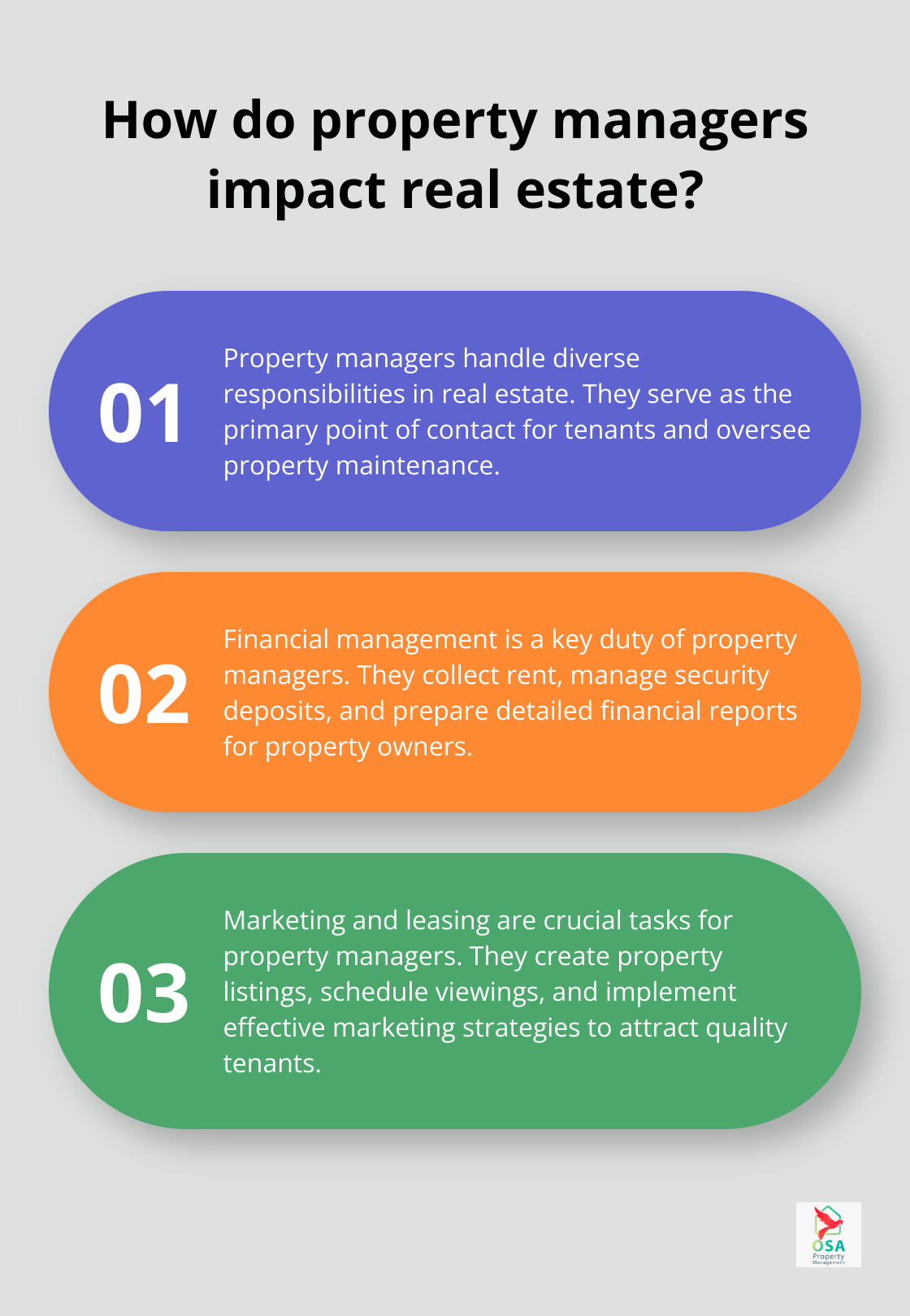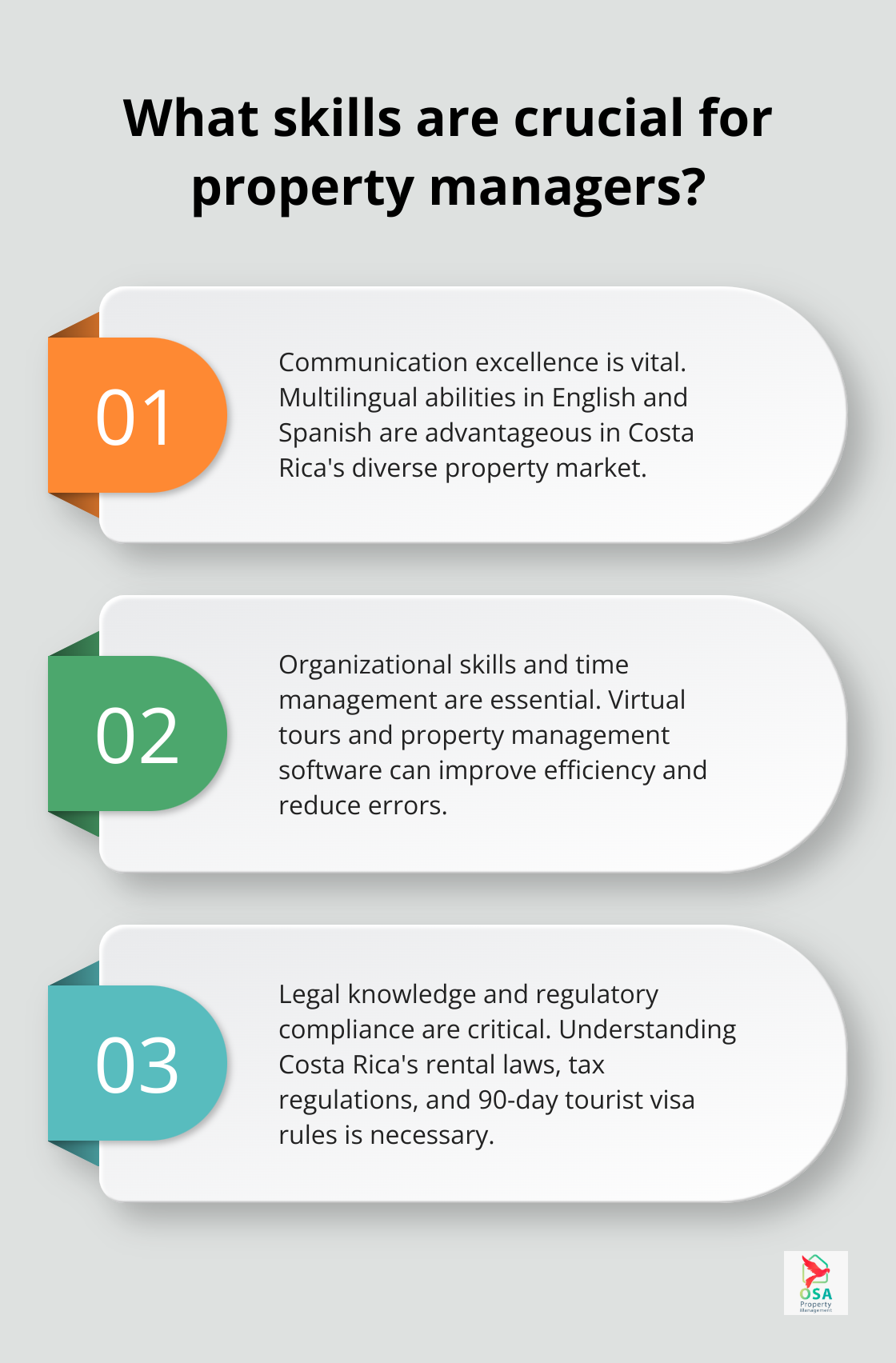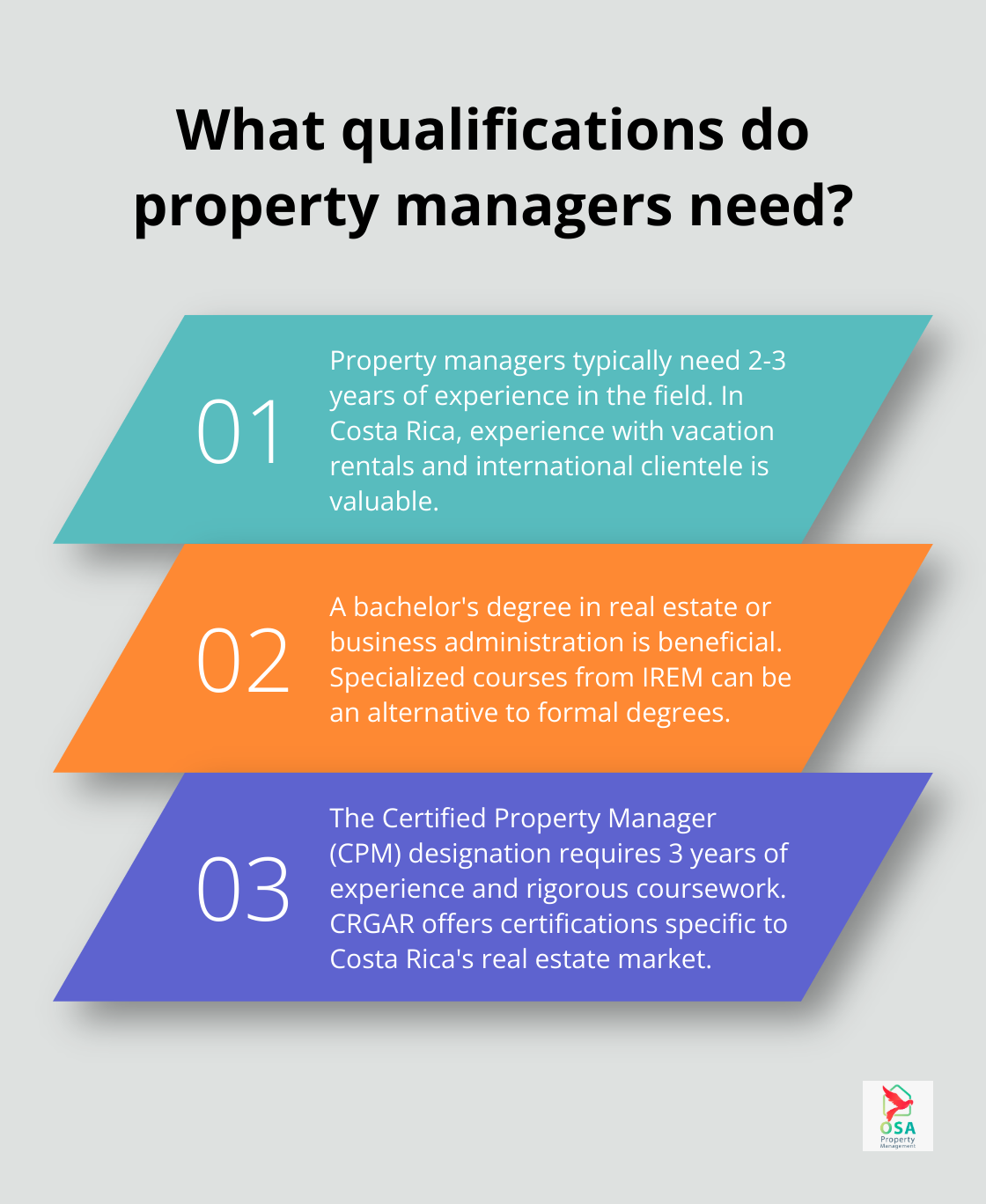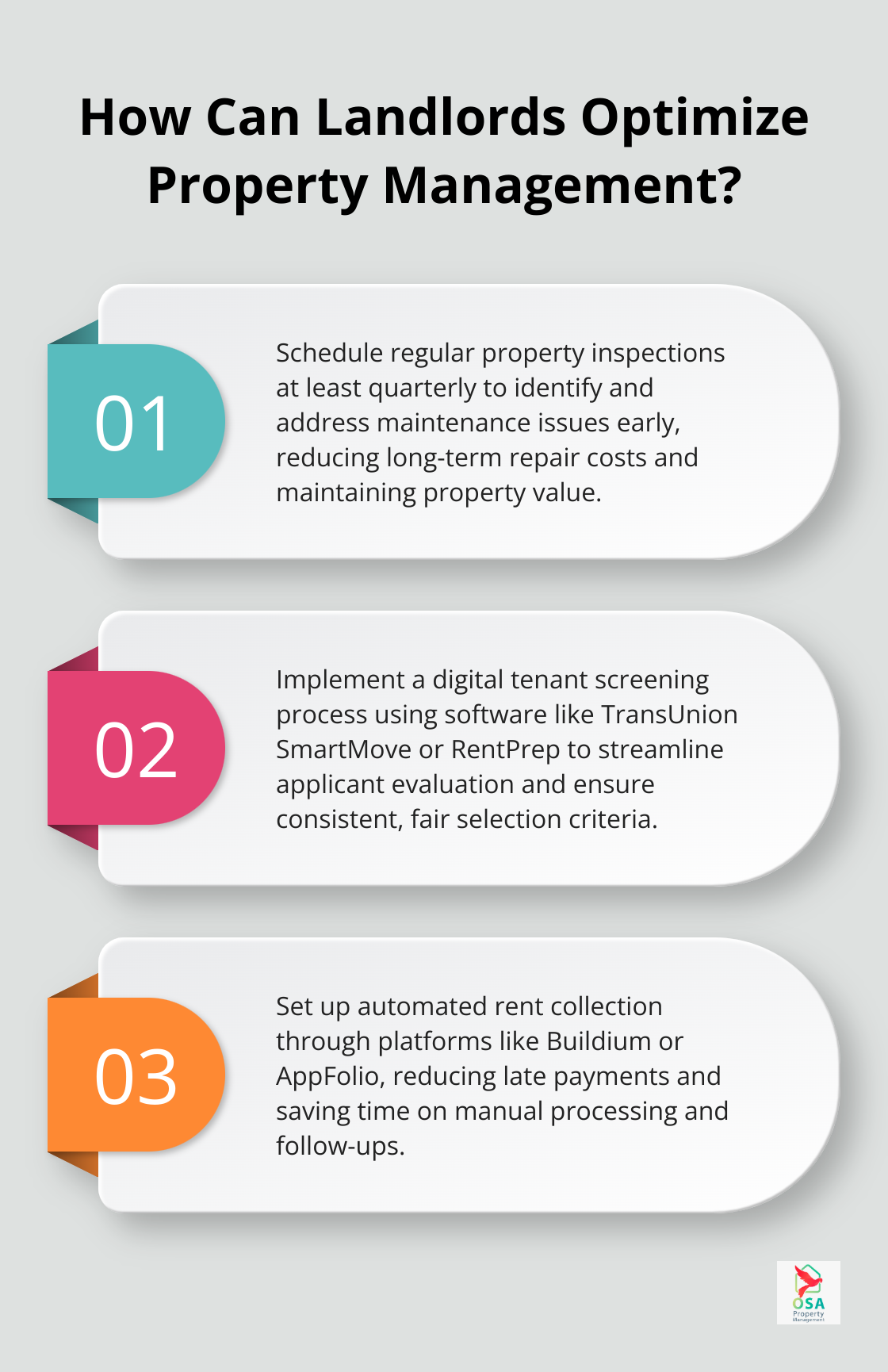At Osa Property Management, we know that crafting an effective property management position description is crucial for attracting top talent. A well-written job description outlines key responsibilities, essential skills, and necessary qualifications for the role.
In this post, we’ll break down the essential components of a comprehensive property manager job description. We’ll also explore how a detailed job posting can benefit both employers and potential candidates in the competitive field of property management.
What Are a Property Manager’s Core Duties?
Property managers play a vital role in the real estate industry, handling a diverse range of responsibilities. This section outlines the key duties that define the property management profession.
Tenant Relations and Property Oversight
Property managers serve as the primary point of contact for tenants. Their responsibilities include:
- Screening potential renters
- Addressing tenant complaints
- Enforcing lease terms
- Conducting regular property inspections
- Coordinating move-ins and move-outs
- Resolving conflicts between tenants

Effective tenant management requires excellent communication skills and a thorough understanding of local rental laws.
Maintenance and Repair Coordination
Overseeing maintenance and repairs is a time-intensive aspect of property management. Property managers must:
- Respond promptly to tenant maintenance requests
- Schedule routine property upkeep
- Coordinate with contractors for larger projects
- Balance cost-effectiveness with quality workmanship
In Costa Rica (where companies like Osa Property Management operate), this often involves navigating local regulations and establishing relationships with reliable service providers in various regions.
Financial Management and Reporting
Accurate financial management is essential for property success. Property managers are responsible for:
- Collecting rent
- Managing security deposits
- Paying property-related expenses
- Preparing detailed financial reports for property owners
These reports typically include income and expense statements, occupancy rates, and maintenance costs. Proactive property management can help reduce resident turnover and maximize benefits.
Property managers must also stay updated on local tax laws and ensure compliance, providing peace of mind for property owners.
Marketing and Leasing Strategies
Attracting quality tenants is a key responsibility of property managers. This involves:
- Creating compelling property listings
- Scheduling property viewings
- Implementing effective marketing strategies
In today’s digital age, property managers must excel at online marketing, utilizing social media and property listing websites to reach potential renters. The 2023 Consumer Housing Trends Report provides insights into what housing consumers are thinking and doing in early-to-mid 2023.
The multifaceted nature of property management requires a blend of interpersonal skills, financial acumen, and practical know-how. The next section will explore the essential skills and qualifications that make a successful property manager.
What Skills Make a Great Property Manager?
Communication Excellence
Effective communication forms the foundation of successful property management. Property managers must interact daily with tenants, owners, contractors, and various stakeholders. They need to convey information clearly, listen actively, and resolve conflicts diplomatically. In Costa Rica’s diverse property market, multilingual abilities prove particularly valuable. Managers who communicate fluently in both English and Spanish gain a distinct advantage in serving international property owners and local tenants.
Organizational and Time Management Prowess
Property management requires exceptional organizational skills. Managers must handle multiple properties, each with its own set of tasks, deadlines, and emergencies. Leveraging virtual tours can make the leasing process more efficient and showcase properties to a global audience. The implementation of robust property management software can significantly improve time management and reduce errors (a key factor in maintaining client satisfaction).
Legal Knowledge and Regulatory Compliance
A thorough understanding of local property laws is essential. Property managers must know the country’s rental laws, tax regulations, and zoning ordinances. This knowledge helps prevent legal issues and ensures compliance. For instance, managers need to understand the intricacies of Costa Rica’s 90-day tourist visa rules when dealing with short-term rentals. Staying updated on legal changes proves vital; attending annual legal seminars or subscribing to legal update services helps managers stay informed (and avoid costly mistakes).
Financial Acumen
Financial management skills play a critical role in maximizing property returns. Property managers must excel at budgeting, financial forecasting, and interpreting financial reports. Income/Expense IQ can help increase the financial performance of properties by utilizing thousands of data points across major markets. Managers should feel comfortable using financial software and provide clear, actionable financial insights to property owners.

These skills set top performers apart in the competitive field of property management. Companies that prioritize continuous skill development ensure their teams deliver exceptional service across Costa Rica’s diverse property landscape. The next section will explore the experience and education requirements that complement these essential skills in creating a well-rounded property manager.
What Experience and Education Do Property Managers Need?
Practical Experience in Real Estate
Employers typically prefer candidates with at least 2-3 years of experience in property management or related fields. This hands-on experience proves invaluable, as it exposes professionals to real-world scenarios they’ll face daily. Dealing with difficult tenants or navigating complex maintenance issues are skills best learned through practice.

In Costa Rica’s unique property market, experience with vacation rentals and international clientele is particularly valuable. Managers who have worked with diverse property types (from beachfront condos to jungle retreats) are better equipped to handle the variety of properties in the region.
Educational Background
A bachelor’s degree in real estate, business administration, or a related field can provide a solid foundation for aspiring property managers. These programs often cover important topics like real estate law, finance, and marketing.
For those without a formal degree, specialized courses in property management can serve as an excellent alternative. The Institute of Real Estate Management (IREM) offers comprehensive courses that cover key aspects of the profession.
Professional Certifications
Industry certifications can significantly boost a property manager’s credibility and expertise. The Certified Property Manager (CPM) designation from IREM is widely recognized and respected in the field. To earn this certification, candidates must complete rigorous coursework and demonstrate a total of three years (36 months) of experience.
In Costa Rica, familiarity with local regulations is essential. Property managers should consider obtaining certifications specific to the country’s real estate laws and practices. The Costa Rica Global Association of Realtors (CRGAR) offers courses and certifications tailored to the local market, as well as various benefits, events, and programs for its members.
Tech Savvy Skills
Modern property management relies heavily on technology. Proficiency with property management software like Buildium, AppFolio, or Yardi is often a requirement. These platforms streamline tasks like rent collection, maintenance requests, and financial reporting.
Experience with digital marketing tools and social media platforms is increasingly important for attracting tenants and showcasing properties. Property managers who can create compelling online listings and leverage virtual tours have a distinct advantage in today’s market (especially in tourist-heavy areas like Costa Rica).
Final Thoughts
A well-crafted property management position description attracts top-tier talent in the competitive real estate industry. It outlines responsibilities, required skills, and qualifications, setting the stage for successful hiring and long-term property management success. Qualified property managers navigate complex legal landscapes, implement effective marketing strategies, and maintain strong tenant relationships.

A comprehensive job description demonstrates the employer’s commitment to professionalism and sets clear expectations for potential applicants. This clarity helps candidates self-assess their suitability for the role and ensures that applicants are more likely to fit the position and company culture. The right property management professionals possess the expertise to optimize property performance and enhance overall efficiency.
At Osa Property Management, we understand the importance of finding exceptional property management professionals. Our team offers customized service packages tailored to meet the unique needs of property owners in Costa Rica’s diverse real estate market (including areas like Tarcoles, Jaco, Dominical, Manuel Antonio, Ojochal, and Uvita). We strive to provide successful property management that benefits owners, tenants, and the broader community.

